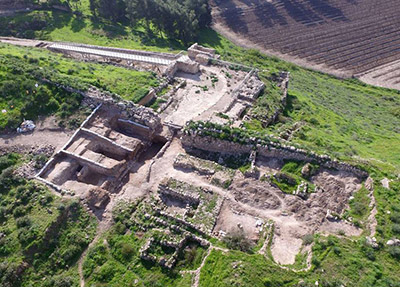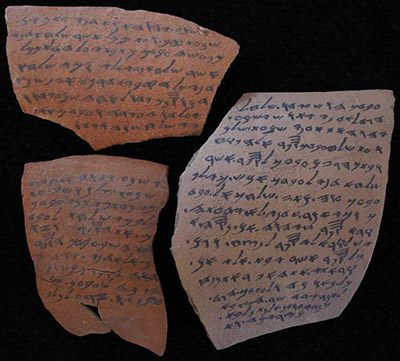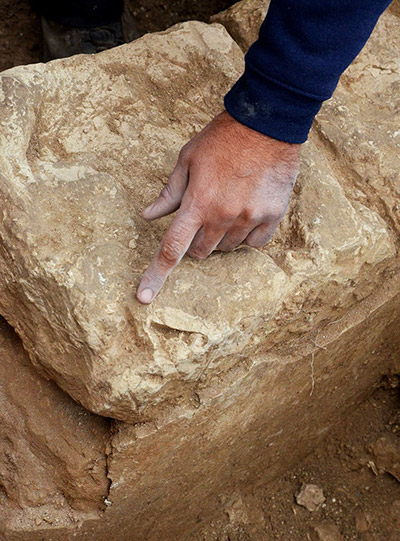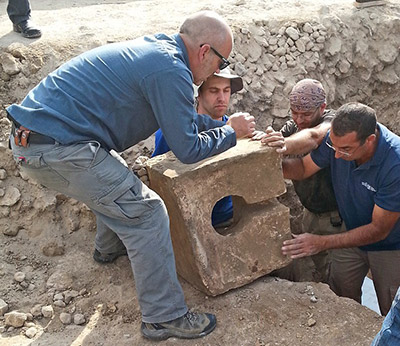
|
Astonishing Archeological Discovery at Lachish
Astonishing Discoveries in the Land of Israel Bring the Nation to the Scriptures
|
|
Sunday, October 02, 2016
|
www.bibleinthenews.com Audio & Print versions
|
In the early days of Zionism, it was suggested that Uganda maybe a suitable place for a national home for the Jewish people. Many of the early secular Zionists were in favour of this idea, which may seem incomprehensible from our perspective. However, when we remember that the goal of the early secular Zionists in the creation of a state of the Jewish people, was to provide a solution to the Jewish problem of dispersion and persecution. The goal was not a revival of ancient Biblical Hebrew culture.
Theodor Herzl wrote in his book, “The Jewish State”, “Shall we end by having a theocracy? No, indeed. Faith unites is, knowledge gives us freedom. We shall therefore prevent any theocratic tendencies from coming to the fore on the part of our priesthood. We shall keep our priests within the confines of their temples in the same way as we shall keep our professional army within the confines of their barracks.”Likewise, Theodor Herzl did not see the revival of the Hebrew language as an essential element for the establishment of a Jewish state. Again, from his famous book, “The Jewish State”: “It might be suggested that our want of a common current language would present difficulties. We cannot converse with one another in Hebrew. Who amongst us has a sufficient acquaintance with Hebrew to ask for a railway ticket in that language! Such a thing cannot be done. Yet the difficulty is very easily circumvented. Every man can preserve the language in which his thoughts are at home." This was in contrast to Eliezer Ben Yehudah, the individual that played the central role in the resurrection of the Hebrew language who said, “There are two things, without which, the Jews will not be a nation: the land and the language."

The recently excavated gate at Lachish.
In a book entitled, Hebrew Reborn, the author, Shalom Spiegel, considers the results of the work of Eliezer Ben Yehudah in the revival of the language, a man who was counted as heretic by his religious contemporaries for bringing the sacred tongue of Hebrew into everyday use. Shalom writes: “Just as they could hardly have surmised that this heretic, through his unwearying service to the Hebrew word, unconsciously aroused the religious forces latent within it. For there is no such thing as creedless Hebrew. He who conjures up Hebrew at the same time involuntarily opens sluices for the obstructed springs of an ancient religious civilization. Though he may not welcome them, neither can he rid himself of the spirits he has called up."
In like manner, the land of Israel has had a similar effect upon the restored Jewish nation. One cannot dig in the land of Israel without involuntarily opening sluices for the obstructed springs of an ancient religious civilization! One only has to think of the Dead Sea Scrolls and the many recent discoveries in the City of David in Jerusalem to realize that this is the case.
Just this last week there was an astonishing archeological discovery announced from the current excavations at Lachish. Lachish was a strategic city for Judah as it lay in the region of the foothills on the coastal plain and so controlled the north south passage for those travelling from Syria to Egypt. There have been previous astonishing discoveries regarding Lachish.
Archeological Discoveries at Lachish
The Lachish letters discovered in the 1930's, written on large pottery fragments, contain communication between important cities of Judah, near the time the city fell to the Babylonians and have interesting Biblical connections. One can feel the spirit of the times as described in the Bible in the letters. There is a prophet mentioned in the Lachish letters who is said to be liable to weaken the hands of the people. This is a similar message to Jeremiah in chapter 38:1-4 where the text says:
"Then Shephatiah the son of Mattan, and Gedaliah the son of Pashur, and Jucal the son of Shelemiah, and Pashur the son of Malchiah, heard the words that Jeremiah had spoken unto all the people, saying, Thus saith the Lord, He that remaineth in this city shall die by the sword, by the famine, and by the pestilence: but he that goeth forth to the Chaldeans shall live; for he shall have his life for a prey, and shall live. Thus saith the Lord, This city shall surely be given into the hand of the king of Babylon's army, which shall take it. Therefore the princes said unto the king, We beseech thee, let this man be put to death: for thus he weakeneth the hands of the men of war that remain in this city, and the hands of all the people, in speaking such words unto them: for this man seeketh not the welfare of this people, but the hurt.”
In one of the letters there is also a record of Coniah son of Elnathan going down to Egypt, which sounds very much like the record in Jeremiah 26:20-23

Some of the Lachish Letters.
The Lachish reliefs, decorating the Lachish room in Sennacherib’s palace, depict the siege of Lachish. The room in the palace was used as a waiting room for foreign dignitaries. Lachish must have been an important city and Judah considered a powerful nation in order for the king of Assyria to boast of his exploits in this way. It is very significant, and fits in with the Biblical account that the reliefs in the palace do not depict Jerusalem! In conjunction with these, the Sennacherib or Taylor Prism fits in with the Biblical record and mentions Hezekiah.
“As to Hezekiah, the Jew, he did not submit to my yoke, I laid siege to his strong cities… Himself I made a prisoner in Jerusalem, his royal residence, like a bird in a cage. I surrounded him with earthwork in order to molest those who were his city’s gate."
King Hezekiah is well represented in Biblical Archeology! There have also been discovered royal seals of Hezekiah and of course Hezekiah’s tunnel bringing the water of the Gihon spring into the city of Jerusalem.

The altar with the smashed horns discovered at Tel Lachish.
Recently the most important gate of the city of Lachish has been excavated. It fits in with other city gates of the time, although larger, and has chambers where the elders and rulers of the city could congregate as described in the book of Ruth. It is also recorded how Hezekiah brought the elders together in this way in 2 Chronicles 32:6,7
"And he set captains of war over the people, and gathered them together to him in the street of the gate of the city, and spake comfortably to them, saying, Be strong and courageous, be not afraid nor dismayed for the king of Assyria, nor for all the multitude that is with him: for there be more with us than with him"
Sa’ar Ganor, the dig’s director described jar handles with impressions indicating that they belonged to the king of Hebron and one of the jar handles says “to the king”, and has a depiction of a four-winged scarab beetle. Hezekiah had this beetle on his official seal. Another handle says, “to Nahum my servant”, which Ganor says was probably a senior offical during the reign of Hezekiah. The archeologist says these jars were probably there in preparation for the Assyrian invasion.
The astonishing discovery was a gate shrine, with two four-horned altars and scores of ceramic finds consisting of lamps, bowls and stands. The horns of the altar had been intentionally smashed and a toilet installed in the shrine! Hezekiah’s reforms are recorded in 2 Kings 18:3-4
"And he did that which was right in the sight of the Lord, according to all that David his father did. He removed the high places, and brake the images, and cut down the groves, and brake in pieces the brasen serpent that Moses had made: for unto th ose days the children of Israel did burn incense to it: and he called it Nehushtan."
This describes the smashed horns on the altar. But what about the toilet? The archaeologist referred to the similar reforms carried out by Jehu in 2 Kings 10. Verses 26, 27 in the ESV read,
"and they brought out the pillar that was in the house of Baal and burned it. And they demolished the pillar of Baal, and demolished the house of Baal, and made it a latrine to this day.”
The Jerusalem Post article as some very interesting comments by government ministers in Israel on this amazing discovery.

The toilet being discovered in the shrine at Tel Lachish.
"“The fascinating new discovery at Tel Lachish is a typical example whereby excavations and further research of heritage sites show us time and time again how Biblical tales that are known to us become historical and archaeological stories,” said Elkin.
"“This discovery is an illuminating example of the verse that described King Hezekiah. Before our very eyes, these new finds become the Biblical verses themselves, and speak in their voice. We in the Ministry of Jerusalem and Heritage will continue to lead the effort whereby as many Israelis as possible will be exposed to the enthralling experience of ancient stones that speak to us of the Bible in their own unique voice.”
"Minister of Culture and Sport, MK Miri Regev, echoed Elkin’s sentiments.
"“The uncovering of these finds joins a long list of discoveries that enlighten us about our historic past – a past that is manifested in our country’s soil and in the writings of the Book of Books,” said Regev.
"“The Bible – the founding book of the Jewish people, draws the country’s boundaries and the heritage of the Jewish people that was exiled from its country, and returned to its homeland,” she continued.
"“It boldly commemorates the way of our forefathers, the prophets, the kings, and the judges, and the Israel Antiquities Authority deserves praise for this important discovery –a discovery that deepens our connection to our ancestors who walked this land.””
This discovery again proves the accuracy of the Biblical records. Not only that, but it also once again demonstrates how the soil of the land of Israel, brings you to the Hebrew scriptures. It is finds such as this that bring the scriptures to the attention of the Jews that have returned to the land. Ezekiel the prophet wrote:
"And ye shall know that I am the Lord, when I shall bring you into the land of Israel, into the country for the which I lifted up mine hand to give it to your fathers.” (Ezekiel 20:42)
Join us again next week, God willing as we watch the Bible in the News. www.bibleinthenews.com This has been David Billington with you. Thanks for listening.
Printed: Sunday, October 02, 2016
Visit www.bibleinthenews.com for a weekly analysis of world politics in the light
of Bible prophecy!